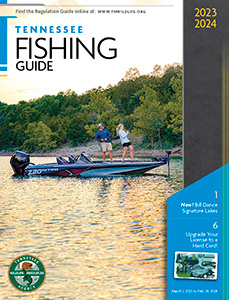Methods Other Than Rod & Reel
Trotlines, Limblines and Jugs
Trotlines consist of a main line with drop lines to which single hooks are attached. Drop lines must not be closer than 24 inches. Nongame fish, except paddlefish and sturgeon, may be taken without limit. Game fish may be taken according to local limits. There is no limit on catfish, except only one fish may exceed 34 inches. The creel limit for skipjack is 100 fish.
Sportfishing trotlines, limblines and jugs must be tagged and/or marked with the owner’s name and address, or TWRA identification number. Trotlines attached to the bank must be tagged on the line within five feet of the bank. Other trotlines must be tagged within five feet of either end, and floating trotlines must be marked on floats. The holder of a sport fishing license may use one or more trotlines not having a combination of more than 100 hooks. Limblines (including yo-yos) must be tagged above water level and are allowed only one hook per line. Sport anglers are limited to 25 limblines. Sport anglers are limited to 50 jugs or blocks and each with only one hook.
Trotlines, limblines and jugs must be run at least once per 24-hour period and are prohibited within 1,000 yards below any TVA or Corps of Engineers dam. Trotlines may not be set within 100 yards of the mouth of any river, creek or slough. Trotlines cannot extend more than three-quarters (0.75) the distance across any stream, river, chute, or embayment.
Exceptions:
- Allen Branch Pond and Chilhowee (McKamy) Pond in Cherokee WMA: Closed to jugs and trotlines.
- Bards Lake on Land Between the Lakes: Closed to trotlines and limblines. Jugs permitted from October 1–March 21.
- Beech River Watershed Development Authority: 20 jugs or blocks per boat. Trotlines prohibited.
- Calderwood Reservoir: Trotlines and limblines prohibited.
- Danville Railroad Bridge Dikes: Trotlines prohibited within 50 yards of dikes.
- Indian Boundary Lake: Closed to trotlines, jugs and limblines.
- New Johnsonville Steam Plant Harbor: 10 jugs or blocks per angler. Trotlines prohibited.
- Norris Reservoir: From January 1 through April 30, trotlines, limblines and jugs are prohibited between River Mile 32 (Point 15) and Hwy. 25E Bridge on the Powell River arm and Between River Mile 137 (Point 31) and the Hwy. 25E Bridge on the Clinch River arm.
- TWRA Lakes: Trotlines and limblines are prohibited. From April 1 through Sept. 30, jug fishing is prohibited on Saturdays, Sundays, Memorial Day, Independence Day and Labor Day. On days open to jug fishing, each boat is limited to 10 jugs or blocks per day.
- Lake Halford: Jug fishing is prohibited.
Slat Baskets
Persons eligible to fish with a slat basket may fish with one slat basket, provided the slat basket is marked with a metal tag, obtainable from the TWRA for an annual fee of $10.00. Possession or use of more than one slat basket is prohibited. A slat basket is defined as a device used for taking nongame fish and catfish only. Slat baskets may have only one outside funnel opening and must be made of wood, plastic or cane slats which are placed lengthwise and so constructed that there must be a minimum of four openings in the catching area, each being at least 1½ inches wide and 6 inches long. Fish taken may not be sold.
The slat basket may not be set within 100 yards of the mouth of any river, creek or slough. Slat basket must be checked at least every 72 hours.
Applications for metal tags can be obtained by writing to: TWRA Sales Office, P.O. Box 41729, Nashville, TN 37204. If you are applying in person and need directions to the TWRA central office, call 615-781-6500. You may also apply online at,
Grabbling, Gigging, Grab Hooks, Snagging, Archery, Crossbow, Speargun
Season open year-round in all waters except:
- where closed to fishing or expressly prohibited.
- within 100 yards below dams. At Pickwick Dam the closed area extends downstream to the first moorage cell across from ramp.
- at John Sevier Steam Plant the discharge channel is closed.
Nongame fish may be taken without limit. Game fish, sturgeon, and alligator gar may not be taken. Catfish, paddlefish, and skipjack may be harvested according to local limits.
Gigging is closed on the East Fork of the Obey River and its tributaries from Jan. 1–April 30.
Snagging is prohibited year-round on the South Holston tailwater (from South Holston Dam to Highway 390 bridge at Bluff City), Center Hill Reservoir, and the Cumberland Fossil Plant discharge channel into Barkley Reservoir, Cherokee Reservoir (Holston River) from Malinda Ferry Road (Hwy. 344) bridge upstream to John Sevier Dam from March 1 through March 31 and April 16 through May 31.
Watts Bar Reservoir: Watts Bar Reservoir from US-321 bridge upstream to Fort Loudon Dam is closed to snagging from March 15 through April 30 and May 16 through May 31.
Grabbling, gigging, grab hooks, snagging, archery, crossbow, speargun is prohibited on the following waters from Jan. 1–Apr. 30:
- Dale Hollow Reservoir: East Fork Obey River and its tributaries.
- Norris Reservoir: between River Mile 32 (Point 15) and the Hwy. 25E Bridge on the Powell River arm and between River Mile 137 (Point 31) and the Hwy. 25E Bridge on the Clinch River arm
- Elk River in Carter County: from the Hwy. 321 Bridge downstream to River Mile 3.0 (Point 11) on the Elk River arm of Watauga Reservoir
- Doe Creek: Old Cabin Private Road downstream to Roan Creek
- Roan Creek: Mountain Lakes Estates Bridge downstream to Doe Creek
- Row Branch: NC state line downstream to end of Cownstown Road

